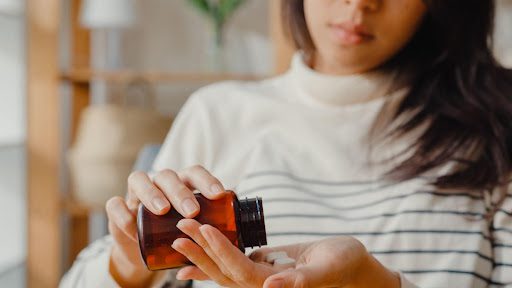Antidepressants can help you get much-needed depression relief, but it can take time to find the most effective one for your needs. How can you make your antidepressants work better for you?
Read on to learn how long it may take for you to start feeling better, tips for getting the most benefit from your medication, and additional treatments that may help you get better symptom relief.

The average lag period for antidepressants to become effective is one-to-two weeks, though it may take three-to-four weeks for most to reach maximum impact. Citalopram and escitalopram have been known to produce noticeable effects as early as the first week. Ketamine is used more selectively than many other antidepressant medications, but it can begin impacting symptoms within several hours of administration. Many providers may consider switching medications after eight weeks, but some may eventually see benefits at twelve weeks.
Individuals coping with ongoing depression symptoms understandably want the quickest symptom relief possible. Antidepressants can be highly effective, but they have a delayed therapeutic response. Why is this?
Antidepressants work by setting off a complex response that takes time to unfold. They immediately block the reuptake of two neurotransmitters, serotonin and norepinephrine, but this effect is not immediately detectable. Instead, changes in neurotransmitter activity begin impacting the expression of a variety of genes related to neuroplasticity within emotional processing regions of the brain, which gradually cause depression symptom alleviation.
As neural circuitry formation increases, individuals show early signs of the antidepressant working. A shift toward a positive bias in emotional processing is the one the first effects to unfold. This shift leads to individuals noticing positive social and environmental cues that reinforce their improved mood, helping them relearn how to seek and enjoy pleasurable activities.
Taking your antidepressant medication as prescribed ensures the most consistent symptom relief. Carefully discuss your provider’s recommendations and ask questions regarding the following areas of concern.
Forgetting a dose or taking it at a different time once in a while should not have a significant impact. However, frequent gaps or changes in your medication schedule may lessen its efficacy.
Side effects are possible with any antidepressant, though some carry a lower risk of side effects severity. Selective serotonin reuptake inhibitors (SSRI) and selective norepinephrine reuptake inhibitors (SNRI) have few adverse effects overall. Together with their proven efficacy, their high tolerability is what makes them a first-line treatment, and why they are recommended over older tricyclic antidepressants, whose side effects include heart rate irregularities.
It is important that you note adverse side effects as soon as they appear, and talk with your provider to discuss a dosage adjustment, tips on minimizing the effects, or a different medication if the effects are not tolerable.
Some antidepressants may interact with substances or other medications, amplifying adverse effects. For example, alcohol may cause excessive drowsiness, and using multiple serotonin reuptake inhibitors may lead to an unsafe level of serotonin in the blood, called serotonin syndrome.
If you still are not experiencing enough symptom relief after several weeks, your provider may advise you to give it more time or adjust the dosage. Some medications may take six to eight weeks to produce the maximum effect.
Unsure what to do if your antidepressant stops working? Even if it does not seem to help anymore, continue taking your medication as prescribed until you can talk with your provider about gradually reducing the dose. Abruptly stopping your medication may be unsafe and result in uncomfortable withdrawal effects.
Depression affects the whole self, so create a foundation of positive health habits to help reduce your symptoms and minimize adverse effects. Create and follow a consistent sleep routine, stay physically active, eat a balanced diet, and avoid substances such as drugs and alcohol.
Antidepressants work well for many individuals, but some only get a partial response. Learn how to make antidepressants work faster for you with these helpful treatment strategies.
Psychotherapy is an effective treatment for depression, often more so when combined with antidepressants than either treatment is alone.
Cognitive Behavioral Therapy (CBT): CBT is an action-oriented approach, addressing the interactions between thoughts, emotions, physical symptoms and behaviors. It works to recruit the patient in a proactive setting that encourages them to face their symptoms, withstand their initially overwhelming effects on them, and slowly work to diminish their role in the patient’s life.
Acceptance and Commitment Therapy (ACT): Rather than working to eradicate adverse symptoms through rationalization, ACT encourages individuals to accept their painful thoughts and emotions through a more understanding approach, identifying personal strengths to help them in the present moment.
Psychodynamic Therapy: This therapeutic approach helps individuals connect their past and present experiences and formative relationships, working through the complex interactions that have led to their depression.
Antidepressant augmentation is a combination therapy using multiple medications to achieve symptom relief when an antidepressant response is insufficient. These are among the most efficacious and commonly used augmenters.
Buspirone is an anxiolytic/antidepressant that can significantly improve cognition for patients contending with depression.
Sustained-release bupropion is an atypical antidepressant with similar efficacy as buspirone but with fewer adverse effects.
Atypical antipsychotics have the most evidence supporting their use with antidepressants. Their side effect burden is significant, but both aripiprazole and quetiapine are FDA approved as augmenters in depression treatment.
When antidepressants alone fall short, augmenting antidepressants with Deep Transcranial Magnetic Stimulation (Deep TMS) can give more complete depression symptom relief. A helmet is utilized to deliver magnetic pulses deeply into regions of the brain associated with depressive symptoms. Over several weeks, the stimulation stabilizes neural activity that gradually alleviates symptoms.
Deep TMS is a noninvasive, FDA-cleared treatment with a history of safety and efficacy.
Sessions are 20 minutes long and can be conveniently scheduled into the typical daily routine.
Deep TMS is not associated with long-term or severe adverse effects. Individuals may experience mild effects such as a brief localized headache.

Depression remains a highly treatable condition with many helpful options and understanding how to make antidepressants work better can help you make the most of your medication. Everyone responds differently to antidepressants, so don’t be discouraged if relief seems elusive at first.